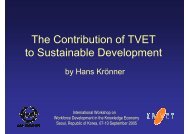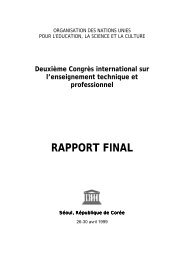Learning for Life, Work and the Future Initial ... - Unesco-Unevoc
Learning for Life, Work and the Future Initial ... - Unesco-Unevoc
Learning for Life, Work and the Future Initial ... - Unesco-Unevoc
You also want an ePaper? Increase the reach of your titles
YUMPU automatically turns print PDFs into web optimized ePapers that Google loves.
Page 36 Participants’ Papers <strong>Learning</strong> <strong>for</strong> <strong>Life</strong>, <strong>Work</strong> <strong>and</strong> <strong>the</strong> <strong>Future</strong><br />
2. Curriculum Development<br />
Two major changes have impacted on curriculum<br />
development at <strong>the</strong> technikons. The shift in emphasis<br />
to outcomes-based education has had a large impact on<br />
curriculum development, resulting in technikons<br />
nationally co-ordinating programme outcomes ra<strong>the</strong>r<br />
than programme content. This implies that individual<br />
technikons must have <strong>the</strong> capacity to develop curriculum<br />
content internally to allow students <strong>the</strong> opportunity<br />
to attain <strong>the</strong> expected outcomes. There are reasons to<br />
believe that all technikons do not necessarily have that<br />
capacity.<br />
The SERTEC requirement that internal quality assurance<br />
must be externally evaluated has prompted <strong>the</strong><br />
development of such internal quality assurance at most<br />
technikons. External monitoring would be a comparable<br />
trigger <strong>for</strong> <strong>the</strong> development of internal curriculum<br />
development capacity that has now become necessary,<br />
<strong>and</strong> questionnaires <strong>and</strong> processes must be developed<br />
<strong>for</strong> such monitoring. Initiatives by some technikons<br />
in this regard could be encouraged in order to<br />
speed up <strong>the</strong> process of developing such external<br />
evaluation.<br />
In some technikons, curriculum development units<br />
have been established. The intention is to externally<br />
monitor <strong>the</strong> efficient functioning of such units, including<br />
<strong>the</strong> role of advisory committees <strong>and</strong> o<strong>the</strong>r<br />
stakeholders across <strong>the</strong> spectrum. Curriculum development<br />
units can at best co-ordinate <strong>and</strong> facilitate<br />
subject-specific curriculum development. The cooperation<br />
between such units <strong>and</strong> academic departments<br />
must be promoted.<br />
3. Staff Development<br />
Internal staff development cannot rely wholly on staff<br />
studying towards higher qualifications at <strong>the</strong> same or a<br />
different institution. It must also take place through<br />
internal short courses, <strong>the</strong> attendance of conferences<br />
<strong>and</strong> seminars, <strong>and</strong> advancement in educational <strong>the</strong>ory<br />
<strong>and</strong> methodology. Many academic departments take<br />
<strong>the</strong> initiative of promoting staff development within<br />
<strong>the</strong>ir departments, <strong>and</strong> staff development units have<br />
been established in some technikons, generally making<br />
a major contribution. Good co-ordination between<br />
such staff development units <strong>and</strong> academic departments<br />
must be established where it does not already<br />
exist.<br />
4. Institutional Management <strong>and</strong> Administration<br />
Some technikons have expressed <strong>the</strong> wish that institutional<br />
administration be subjected to external quality<br />
monitoring. This could include <strong>the</strong> monitoring of<br />
management <strong>and</strong> financial functions. The intention<br />
would not be to play <strong>the</strong> role of external watchdog, but<br />
ra<strong>the</strong>r to promote internal quality assurance processes<br />
with regard to management <strong>and</strong> administration.<br />
Financial audits are often regarded as <strong>the</strong> only necessary<br />
external activity in financial administration.<br />
However, although <strong>the</strong>se attend to <strong>the</strong> correctness of<br />
accounting procedures <strong>the</strong>y do not necessarily ensure<br />
financial effectiveness <strong>and</strong> efficiency in administration.<br />
Institutional management <strong>and</strong> administration should<br />
<strong>the</strong>re<strong>for</strong>e include all three aspects of financial conduct.<br />
These functions fall mostly under <strong>the</strong> remit of <strong>the</strong><br />
Rector <strong>and</strong> <strong>the</strong> Registrar, <strong>and</strong> would clearly be a<br />
sensitive area <strong>for</strong> external quality monitoring.<br />
5. Student Career Guidance <strong>and</strong> Psychological<br />
Support Services<br />
With <strong>the</strong> changes in student demography, <strong>the</strong> support<br />
students receive from <strong>the</strong> technikons in career guidance<br />
<strong>and</strong> psychological support is becoming increasingly<br />
important. Such services need to be professionally<br />
conducted, <strong>and</strong> some technikons have established units<br />
<strong>for</strong> this purpose. External quality monitoring of those<br />
services would complete <strong>the</strong> full cycle of quality<br />
assurance at <strong>the</strong> technikons.<br />
6. Generic Process <strong>and</strong> Questionnaires<br />
As is <strong>the</strong> case with most o<strong>the</strong>r SERTEC processes <strong>and</strong><br />
questionnaires, an attempt should be made to develop,<br />
with <strong>the</strong> co-operation of <strong>the</strong> CTP, <strong>the</strong> necessary generic<br />
processes <strong>and</strong> questionnaires <strong>for</strong> <strong>the</strong> conduct of external<br />
quality monitoring of <strong>the</strong> above academic <strong>and</strong><br />
administrative support services. O<strong>the</strong>r similar services<br />
not mentioned above must be included, <strong>and</strong> <strong>the</strong><br />
Council of SERTEC might consider co-operating with<br />
<strong>the</strong> CTP in <strong>the</strong> development of <strong>the</strong>se processes.<br />
7. Recommendations<br />
It is recommended that:<br />
• Academic support services <strong>and</strong> administration be<br />
included in <strong>the</strong> external quality monitoring by<br />
SERTEC;<br />
• The initiatives taken by some technikons be coordinated<br />
<strong>for</strong> <strong>the</strong> development of <strong>the</strong> necessary<br />
processes to avoid ‘reinventing <strong>the</strong> wheel’;<br />
• The design of <strong>the</strong> above processes be referred to <strong>the</strong><br />
CTP to develop in co-operation with SERTEC;<br />
• The matter be finalized expediently to ensure <strong>the</strong><br />
conduct of such external evaluations be<strong>for</strong>e <strong>the</strong> end<br />
of 2002. In this way, a complete package of quality<br />
assurance could be h<strong>and</strong>ed over to <strong>the</strong> HEQC in<br />
2003. Such a package would satisfy <strong>the</strong> requirements<br />
of <strong>the</strong> Higher Education Act, i.e. quality<br />
promotion, institutional audit, <strong>and</strong> programme<br />
assessment <strong>and</strong> accreditation.





